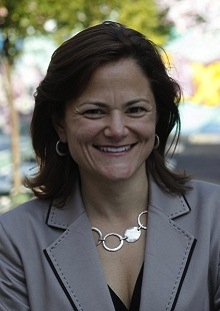
Opponents say Mark-Viverito doesn’t get the Bronx
Three months after the city’s Districting Commision radically reconfigured Council District 8, shifting much of it from East Harlem to Mott Haven, City Councilwoman Melissa Mark-Viverito says nothing has changed in her reelection campaign.
But her opponents for the council seat disagree, arguing that the incumbent is Manhattan-oriented and out of touch with the South Bronx, a criticism Mark-Viverito dismisses. With 50.1 percent of the new district in the Bronx, the challengers insist that a candidate whose base is in the Bronx has more than a fighting chance.
“It gives a great opportunity to take on somebody like Melissa,” said Ed Santos, a Department of Education consultant and Community Board 11 member who is running for the seat. “Not only does she come into this race introducing herself to a district where 50% of the voters are new to her,” Santos wrote in an email to the Herald, “but her electoral performance lags far behind many incumbents in districts across the city.”

Another candidate for the seat, East Harlem public health educator and Mott Haven resident Angel Molina, agrees.
“There hasn’t been sufficient attention paid to Mott Haven,” Molina said.
Mark-Viverito says the new district lines will change nothing.
“The issues are completely the same,” she said. “I’m going to be the candidate I’ve always been.”
Mark-Viverito says local priorities include the need for public housing, immigration reform and ending the NYPD’s stop-and-frisk policy—all of which affect neighborhoods across the city, she added. She insists her opponents’ claims that she is more concerned with Manhattan than Mott Haven are wrong.
“There are always going to be people who criticize,” she said. “In fact, I’ve done a lot of work and brought a lot of resources to public housing and parks.”
She cited the innovative participatory budgeting initiative for which she allocated $1 million in discretionary spending to finance five improvement projects chosen by residents of her district, including security cameras for four housing projects, laptops for nine schools and a new solar-paneled greenhouse.
Some Mott Haven residents loudly criticized Mark-Viverito at a Community Board 1 meeting in November, questioning her commitment to the South Bronx. Mark-Viverito says such criticisms are unfounded.
“I would just say that people need to be better informed before they criticize,” she said.
Another candidate, community activist and longtime East Harlem resident Gwen Goodwin, promises to get to know the new South Bronx section of the district better.
“I am not an expert on Mott Haven yet, but I will be,” Goodwin said, and charged that Mark-Viverito “shopped around” for a district before she was first elected in 2006.“I did not redistrict Mott Haven. Some other big shots did that.”
“Melissa didn’t even know East Harlem when she dropped in,” she added.
Mark-Viverito and her opponents have similar views on some of the issues, such as ending stop-and-frisk. Goodwin and Santos, however, differ with the incumbent on the city’s policy of building market rate housing on land owned by NYCHA, known as infill. Mark-Viverito has objected to one such East Harlem project, arguing city officials pushed it through too quickly. Goodwin and Santos say that’s not good enough.
“It’s about the mismanagement of NYCHA, not about the process,” Santos argues. Despite the crowded field, Mark-Viverito says she likes her chances this year.
“I’m very confident I’ll win by a wide margin,” she said. “I know that my record will outshine anybody else’s.”
Molina said he is aware he is an underdog in the race. Still, he remains hopeful.
“I think my chances are as good as anybody who’s out there,” he said. “Anything can happen in politics.”

